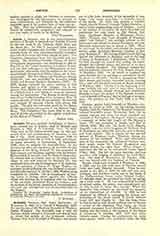

Arundel, THOMAS, sixtieth Archbishop of Canterbury, second son of Robert, Earl of Arundel and Warren, b. 1353; d. February 19, 1414. In 1374, while only in his twenty-second year, he was promoted from the archdeaconry of Taunton to the See of Ely. Made chancellor, October 24, 1386, he was translated from Ely to York in 1388, and thence, by papal provision, to Canterbury, September 25, 1396, when he resigned the chancellorship. In the second year after his translation he incurred the displeasure of the King, Richard II, was attainted of high treason, and banished, together with his brother, Richard Earl of Arundel, and the Duke of Gloucester. He retired, first to France, then to the papal court, where he was well received by Boniface IX, who conferred upon him the Archbishopric of St. Andrews. On the accession of Henry IV, Roger Walden, his successor in the primatial see, was declared a usurper, and Arundel restored, October 21, 1399, Walden being translated to London. He is conspicuous as having taken a strong stand against the Lollards whose new doctrine he, in company with the bishops of the province, petitioned Rome to condemn, and on account of his sturdy assertion of Transubstantiation and the prerogatives and divine institution of the Papacy.
F. AVELING

